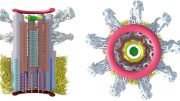
Researchers analyzed data from The Thoracic Cancers International COVID-19 Collaboration (TERAVOLT) to assess the impact of COVID-19 on patients with thoracic malignancies worldwide. They identified seven major determinants affecting the risk of death for patients with both SARS-CoV-2 infection and thoracic cancer.
The risk of death for patients with SARS-CoV-2 infection and thoracic cancer is based on seven major determinants, according to research published in the Journal of Thoracic Oncology, the official journal of the International Association for the Study of Lung Cancer.
The researchers analyzed data from The Thoracic Cancers International COVID-19 Collaboration (TERAVOLT), which is an active global registry that was established in March 2020 to understand the impact of COVID-19 infection on patients with thoracic malignancies in academic and community practices globally.
In total, 114 centers across 19 countries have activated the study, and 92 have contributed data. Eligibility criteria were patients with thoracic cancer (non-small cell lung cancer [NSCLC], small cell lung cancer, mesothelioma, thymic epithelial tumors, and other neuroendocrine tumors with pulmonary origin) with a COVID-19 diagnosis defined as any of the following: laboratory confirmed (using RT12 PCR/serology) infection; or suspected SARS-CoV-2 infection based on radiological findings consistent with COVID-19 pneumonia and clinical symptoms (i.e., fever >37.5°C or 99.5°F, cough, decrease of oxygen saturation of at least 5%, cough, diarrhea, otitis, dysgeusia, myalgia, arthralgia, conjunctivitis, and rhinorrhea).
In addition to reporting on outcomes associated with morbidity and mortality, TERAVOLT aims to determine the risk factors associated with poor outcomes, as well as provide practitioners with real-time data on therapies that may impact survival to COVID-19 and evaluate long-term impacts on care and the delay in care to patients with both curable and incurable thoracic malignancies.
As of April 15, 2021, the researchers had evaluated 1491 patients from 18 countries. With a mean observation period of 42 days, Cortellini and co-researchers reported 361 events with an all-cause case fatality rate of 24.2%.
The fast-backward step-down selection then identified seven major determinants of death from more than 70 variables analyzed:
- ECOG-PS (OR 2.47 1.87-3.26)
- Neutrophil count (OR 2.46 1.76-3.44)
- serum procalcitonin (OR 2.37 1.64-3.43)
- tumor stage at COVID-19 diagnosis (OR 1.97 1.46-2.66)
- development of pneumonia (OR 1.95 1.48-2.58)
- c-reactive protein (CRP) (OR 1.90 1.43-2.51)
- and age (OR 1.71 1.29-2.26).
Given the disease characteristics and the common target organ, patients with thoracic malignancies have been shown to experience higher morbidity and mortality from SARS-CoV-2 infection, with case fatality rates ranging from 22% to 41% according to literature. Poor ECOG-PS demonstrated the strongest association with poor outcome from COVID-19.
“Despite the ongoing efforts including immunization campaigns and increased capacity, SARS-CoV-2 will still impact the continuity of care of patients with cancer, at least to a certain extent. Against the evolving scenario, we provided a comprehensive and powered prognostication system that can be a useful tool for clinicians,” said Alessio Cortellini, MD, from the Imperial College London, London, United Kingdom.
“Currently, this analysis did not look at the impact of COVID-19 vaccination. The TERAVOLT database was recently updated to capture information about vaccination status, as well as information about the specific variants. A separate analysis will be performed with the new data.” said Jennifer G Whisenant, PhD, from the Vanderbilt University, Nashville, Tenn.
Reference: “A definitive prognostication system for patients with thoracic malignancies diagnosed with COVID-19: an update from the TERAVOLT registry” by Jennifer G. Whisenant, Javier Baena, Alessio Cortellini, Li-Ching Huang, Giuseppe Lo Russo, Luca Porcu, Selina K. Wong, Christine M. Bestvina, Matthew D. Hellmann, Elisa Roca, Hira Rizvi, Isabelle Monnet, Amel Boudjemaa, Jacobo Rogado, Giulia Pasello, Natasha B. Leighl, Oscar Arrieta, Avinash Aujayeb, Ullas Batra, Ahmed Y. Azzam, Mojca Unk, Mohammed A. Azab, Ardak N. Zhumagaliyeva, Carlos Gomez-Martin, Juan B. Blaquier, Erica Geraedts, Giannis Mountzios, Gloria Serrano-Montero, Niels Reinmuth, Linda Coate, Melina Marmarelis, Carolyn J. Presley, Fred R. Hirsch, Pilar Garrido, Hina Khan, Alice Baggi, Celine Mascaux, Balazs Halmos, Giovanni L. Ceresoli, Mary J. Fidler, Vieri Scotti, Anne-Cécile Métivier, Lionel Falchero, Enriqueta Felip, Carlo Genova, Julien Mazieres, Umit Tapan, Julie Brahmer, Emilio Bria, Sonam Puri, Sanjay Popat, Karen L. Reckamp, Floriana Morgillo, Ernest Nadal, Francesca Mazzoni, Francesco Agustoni, Jair Bar, Federica Grosso, Virginie Avrillon, Jyoti D. Patel, Fabio Gomes, Ehab Ibrahim, Annalisa Trama, Anna C. Bettini, Fabrice Barlesi, Anne-Marie Dingemans, Heather Wakelee, Solange Peters, Leora Horn, Marina Chiara Garassino and Valter Torri On behalf of theTERAVOLT study group, 1 February 2022, Journal of Thoracic Oncology.
DOI: 10.1016/j.jtho.2021.12.015
This TERAVOLT study was awarded a grant from the Lung Ambition that supported database development and maintenance and acknowledges support from the International Association for the Study of Lung Cancer (IASLC).










Be the first to comment on "TERAVOLT: Seven Factors Identified That Increase Mortality Risk for Patients With COVID-19"